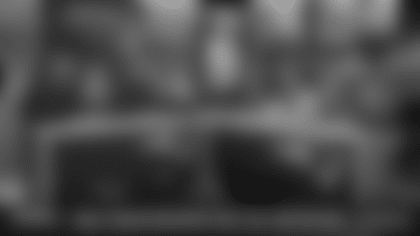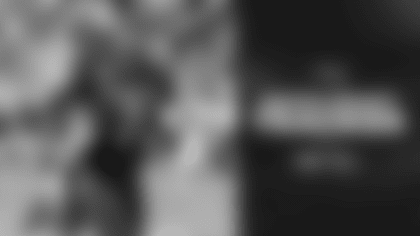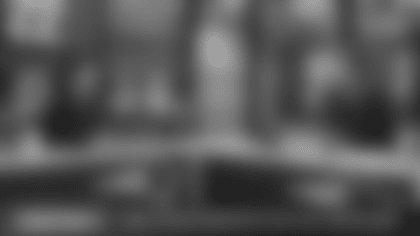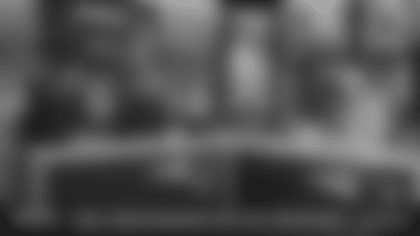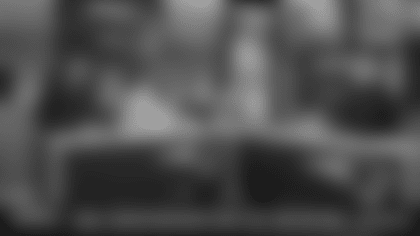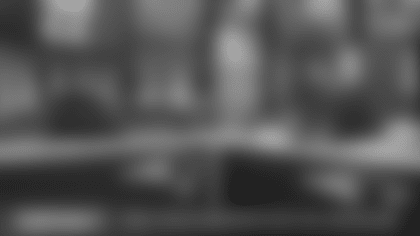BB: We've really tried to turn the page on this one pretty quickly. We've already really started our preparations for the Rams. It's going to be a short week here and we want to get on to them as soon as possible, so we ran through the Jet game. As I said yesterday, it was a tough, hard-fought game. It came down to a few plays. Fortunately, we were able to make enough of them to win and that's good. There are plenty of things we can work on and learn from. We'll try to incorporate those into our St. Louis preparations and make sure we address some of the things we feel like we need to work on from the Jet game, but at the same time, we need to get onto the Rams. That's really where we're at. It will be a big challenge for us this week, but I think the players are, based on the ones I've seen today that have been in and from last night, they're excited to be 2-0 in the division and looking forward to the opportunity to play well on Sunday against a new opponent that we have to get to know and become familiar with. It's a very young and aggressive and fast and explosive team. Hopefully we'll be up to that challenge.
Q: What did you like about the idea of taking the ball to start with this overtime format now?
BB: I think like any game decision, it's unique to that game. If that decision were to come up in the future in a different game, maybe it would be the same decision, maybe it wouldn't, I don't know. We just felt like in the game yesterday at that point, when I sent them out, that if we had an opportunity to take the ball first, then we wanted to do that. Of course, a touchdown could end the overtime and that would have been the optimal scenario. I didn't think the wind conditions were really that significant; it was more of a crosswind than a downfield wind and based on the way the game was going, the conditions at the time and so forth, we just felt like that was the best opportunity. I think you could certainly make an argument for doing something else depending on how you wanted to handle it.
Q: With a guy like Shane Vereen, who got limited reps and then gets forced into service, is it more about the kind of athlete he is or is it more about how hard he works in practice?
BB: I think it's a combination of a lot of things but it really comes down to everybody on our team being ready to go, period. Just ready to go, preparing during the week, getting ready to do their job and then with however many and whatever opportunities present themselves in the game, being able to go out there and do it at a quality level. That's what every one of our players prepares for. Playing time is not something that a player controls. Opportunity isn't something that they control. They don't call the plays and they don't know what the defenses are going to be or what the other side of the ball is going to be, so those opportunities aren't always 100 percent predictable. Sometimes you think this is the way it's going to work out and sometimes it works out that way. Most of the time it doesn't, but there are a lot of plays that you just don't know what the opportunities are going to present. The most important thing is every player being mentally and physically prepared to do their job, to handle whatever adjustments have to be made before or after the snap, and then to go out there and do it. That's everybody's job. Shane is a good athlete. Shane has worked hard, he's a smart kid and he had more opportunities yesterday than he's had since the preseason. Like everybody who played yesterday, there were some good things to build on and there were some things they could have done better. We'll just keep going forward and try to work on some things and build on some of the positive things. I think everybody's job on the team is the same. I don't think we differentiate from one player to the next. We try to approach it all the same way and we try to have them all approach it the same way. It's preparation then performance with whatever the opportunities are that they get.
Q: You've talked before about 'Finding the Winning Edge.' When that book came out, what did it mean for you?
BB: I've read a lot of books, so off the top of my head, I'm not familiar with the exact contents of that one. I'm not saying I haven't read it or am not familiar with it, but I don't have it right off the top of my head right now.
Q: We talked a little bit about the nature of the travel during this stretch. After going out to Seattle, are you relieved that you had a chance to come home and play a home game before going to London? Logistically speaking, does it make it easier having been through a situation like that, having to travel to Europe in the middle of the season, having gone through that before?
BB: I think organizationally, it probably helps to have been through that. We have an awful lot of players on our team that are with us now that weren't on that trip. Individually, I think there isn't a great deal of experience for that. Organizationally, some of the things we know we have to plan for [that] we dealt with the last time, we can learn from and maybe improve on. But each year is different, each trip is different, each team is different. I think the needs of this team are a little different than the needs of the '09 team when we went out there. There are some things that are definitely unique to this trip that were a little different from the other one, but at the same time there are certainly some things that we can reflect back on and use in our preparation this time. It's always good to play at home [like] yesterday, but we know at the start of the year we're going to have eight home games and eight road games. For every home game, there's a road game and vice versa. It's all going to come out the same in the end. There's nothing really we can do about that. We'll take them all as they come, like all the rest of the teams do in this league. We'll try to do the best we can with each opportunity, but we really can't worry about it because in the end, it's eight and eight. When they come, it's just the schedule. It's out of our control.
Q: Do you like going on these types of trips to generate interest for the NFL abroad?
BB: Wherever they schedule them, we'll show up and play them. That's really what it's about for us.
Q: You talked yesterday after the game about the secondary doing a good job of keeping the ball in front of them. Is that something that was an added point of emphasis this week or is that something you're always emphasizing regardless of the week and you just did a better job executing yesterday?
BB: It's definitely a point of emphasis every week. There's no defense that's designed to give up 50-yard pass completions or anything like that. That's really the worst thing that can happen defensively, is for the offense to get all their yardage or score on one play and not make them drive the ball and execute a number of plays and third down and red area and goal line and all those situations. If they just get it all in one play, then that's it. It's always a point of emphasis. It's never anything that we want to have happen. We emphasized it last week; we've emphasized it every week. When we had as many big plays as we did in the Seattle game, it became more of a battle cry and I want to say one of the results yesterday of that [was that] we had more opportunities in the red area and we made a couple defensive stops in the red area and that's good. That's a good way to hold the points down rather than seeing it all go in one play and be a 50-yard touchdown. They have to drive it and it gives you a chance to stop them and we did that a couple times and came close to blocking one of the field goals. You make your opponent work to get their points and work to get their yardage. That's much better than just handing it to them all in one play or one pass interference call or one play that gains a lot of yards. It's a big point of emphasis, but it always is. Last week, we probably spent even more time addressing it.
Q: On Devin McCourty's kickoff return, it looked like it was a return designed to go to the right. When you get a kick that's fielded to the left part of the end zone, do you schematically always have an out with a blocker that's a just-in-case guy, making a lane going to the left, which it looked like Marquice Cole was, which opened up the lane for Devin to hit and then he just kind of hit it?
BB: I think any time that you have to make that play, I think your description of it is pretty accurate. I think that's right. Any time you catch the ball on one side of the field and the blocking pattern is more to the other side of the field as the runner starts to move across the field and follow that blocking pattern – if the coverage team sees that same pattern and over commits to it, sometimes there can be a seam created as the runner is heading to that side of the field and he's able to undercut the coverage and just find that one seam there and hit it and not get to the blocking pattern. Sometimes you're able to seal the coverage and take the blocking pattern the way it's designed. Sometimes those flow defenders play over the top or play across the blocks and create a seam. I think that was pretty much what happened on that play. Devin was going to the right, a seam opened up and he was able to get through it and made a good run, good move on the kicker and was able to find that. That's, again, fairly common on – whether it be a running play or a return that's designed to go to the side. If the defense over pursues it, there's a natural cutback lane there that a good runner can see and know when he can get in it and when he can't. If those defenders hold on the backsides, if they don't give up that cutback lane, hopefully that should give you a better chance to run to where the blocking pattern is designed because those guys are keeping their leverage on the backside.
Q: In your study of the end of game play of the forced fumble, is Rob Ninkovich's play even more amazing that he was able to get the sack, which he shared with Jermaine Cunningham, but to get the half sack, the strip and recovery all in one play?
BB: It's something that we talk about and work on every week and talk to the players and their awareness about not just hitting the quarterback, but having an awareness of the ball. We've seen Rob do that several times already this year. We saw it in the Buffalo game and we saw it in the Denver game and we saw in the Jets game. It's not just sacking the quarterback, but as you go to tackle him that you have an awareness of where the ball is. As you go to make the tackle, if you can hit the ball or put pressure on the ball. As a quarterback, when you grip the ball, you don't really have it secured like a running back does, when he covers the nose of the ball and has three points of contact between his rib cage, his elbow and the nose of the ball. It's much harder to dislodge the ball when it's there than when it's in the quarterback's grip. Rob has done that on numerous occasions, including last year as well. He has a good feel for that. It's just an instinctive play that we coach and we talk about, but every play like that is different. It's really the player's awareness – in this case Rob's awareness – that made it a game-changing play. Not only did he finish the tackle; he had that awareness of the ball being down to his left side and was able to knock it out and once he knew the ball was out then he instinctively rolled over Mark [Sanchez] and just came up and recovered it. It's a heads up play by Rob that we've worked hard on it and Rob has really had several opportunities to do this year and he's done it well in all of them. As you mentioned, it was a key play by Jermaine to be able to come inside on [Brandon] Moore and get to Sanchez's legs and tie him up there so he couldn't move. I think Sanchez really wasn't able to avoid that hit and just didn't have quite enough time to get the ball tucked way before Rob it him. It was a good play by both players.


